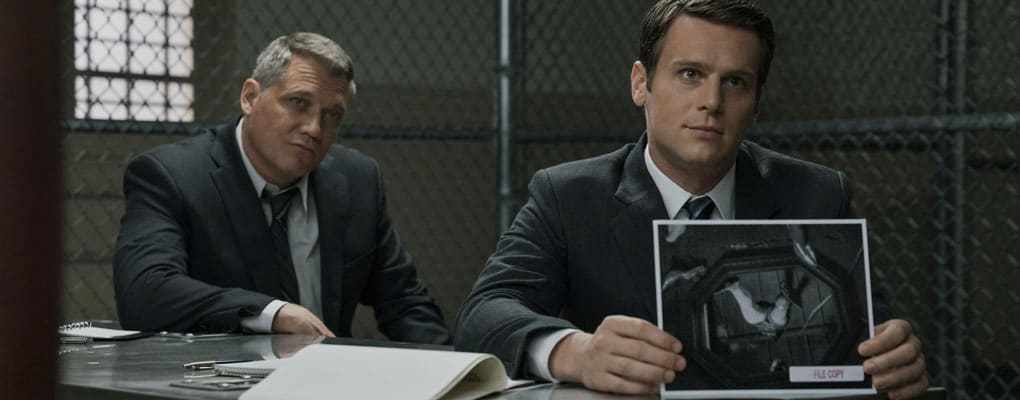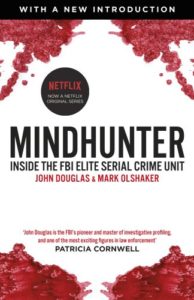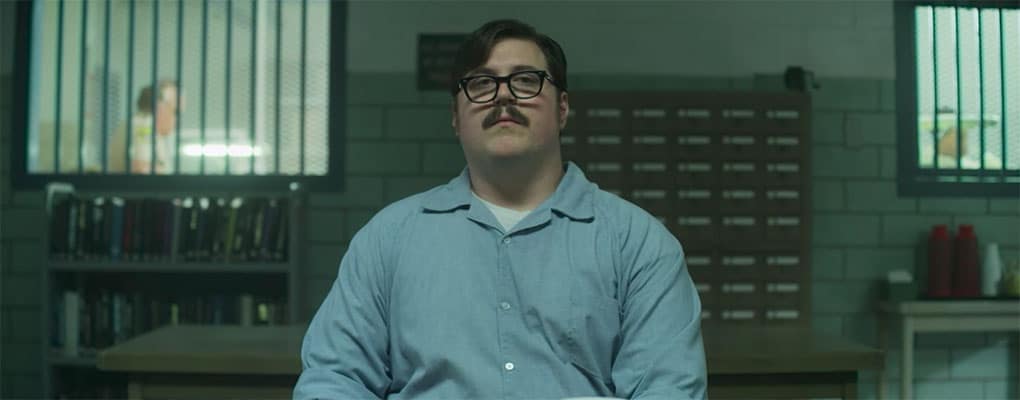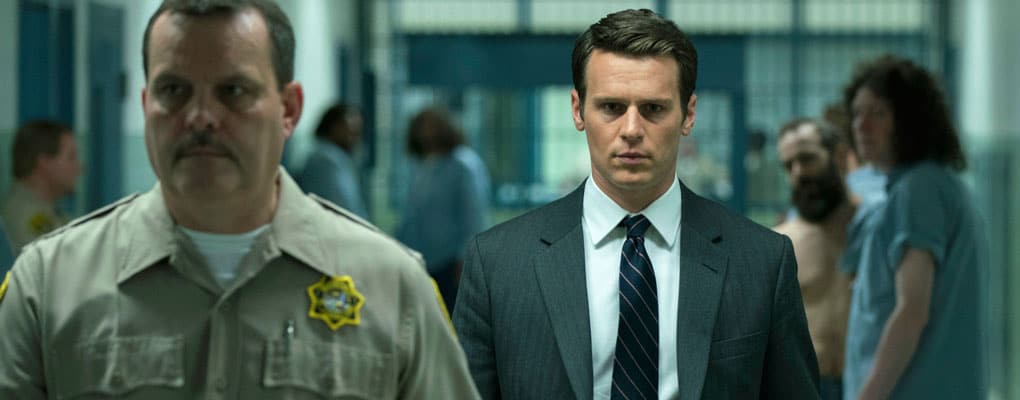Features
Mindhunter: the verdict
Every now and again a series hits a streaming service like Netflix or Amazon Prime that’s so eminently watchable that it’s almost impossible not to binge the whole thing over one very short tea, crisps and duvet-on-the-sofa-centred weekend. And Netflix has come up trumps once again in this regard, this time with their brilliant new original crime drama, Mindhunter.
“Used to be you find a victim with 50 stab wounds, you look for the jilted lover. Now? It could be a random run-in with a disgruntled mailman. It’s a different era.”
That era? The late 1970’s. America is held tight in the grip of a brutal and unprecedented serial killer epidemic. And no one knows quite why. Disturbed people are murdering strangers in cruel and unusual ways and the reasoning behind the crimes remains elusive. Until the invention of the FBI’s Behavioral Sciences Unit, that is.
Mindhunter tells the story of how the BSU came to be. Working out of the basement of the Federal Bureau of Investigation’s Quantico HQ, the pioneers of Behavioral Sciences decided that in order to deal with this new type of murderer, systematic analysis of the serial killer psychology was needed. Or, to pull a quote directly from the script, “How do we get ahead of crazy if we don’t know how crazy thinks?”
The year is 1977 and the term ‘serial killer’ doesn’t even exist yet. In fact, we have to wait until episode nine to see the phrase be born during a spitballing session on murderer terminology. Veteran agent Bill Tench (a career best turn from character actor extraordinaire Holt McCallany) recruits fresh-faced hostage mediator Holden Ford (Glee’s Jonathan Groff) to help set up the new department.
Their main duty and the hook of the series? To conduct empirical research on what makes serial and spree killers tick, chart their mental characteristics and – in doing so – change the face of homicide investigation forever. The way they go about it? By travelling the country, relentlessly interviewing some of the most sadistic killers currently in maximum security penitentiaries. They even find time to test their new findings and theories with the odd head-scratching local crime that gets put their way by flummoxed local police chiefs.

The series is rather loosely based on the bestselling book Mindhunter: Inside the FBI’s Elite Serial Crime Unit, written by criminal profiling experts John Douglas and Mark Olshaker. Douglas’ work as the founder of the FBI’s Behavioral Sciences Unit would go on to inspire a thousand crime writers, not least of all Thomas ‘The Silence Of The Lambs‘ Harris. For fans of the Hannibal Lector canon, or anyone who enjoys shows like CSI and Criminal Minds, serial killer profiling may seem a little old hat. But whereas those all use criminal psychology as a jumping-off point for their thrills n’ spills, Mindhunter burrows deep into the minutiae of violent offender mentality.
 The biggest name attached to the project is Fight Club and Se7en director David Fincher. Known for his meticulous attention to detail, he brings the feel of his serial killer film Zodiac to proceedings. Producing the series and directing four of the ten episodes, Fincher very much applies the same pace, tone and atmosphere to the show as he did to his Jake Gyllenhaal-starring 2007 film about the infamous Zodiac killer. Mindhunter has the same languid pace, sterile and muted palate and eerie lack of titillation. It also concerns itself with the less ‘glamourous’ side of crime; the administration and bureaucracy of law enforcement, the limited technology and resources and the often rather backwards thinking of people in positions of power and influence.
The biggest name attached to the project is Fight Club and Se7en director David Fincher. Known for his meticulous attention to detail, he brings the feel of his serial killer film Zodiac to proceedings. Producing the series and directing four of the ten episodes, Fincher very much applies the same pace, tone and atmosphere to the show as he did to his Jake Gyllenhaal-starring 2007 film about the infamous Zodiac killer. Mindhunter has the same languid pace, sterile and muted palate and eerie lack of titillation. It also concerns itself with the less ‘glamourous’ side of crime; the administration and bureaucracy of law enforcement, the limited technology and resources and the often rather backwards thinking of people in positions of power and influence.
Joining the two lead agents on the team are Boston University professor Dr Wendy Carr (a classy if slightly underused Anna Torv from Fringe) and toadying fellow federal agent Gregg Smith (Joe Tuttle). Character development, it has to be said, is one of Mindhunter’s strongest suits. There are no cardboard cutout stock characters here. Everyone is well-rounded, multi-layered and ‘real’.
Our main character Holden Ford (a basic approximation of John Douglas) starts out a little nervous, with more than a faint whiff of wide-eyed greenhorn about him. While his chain-smoking older partner Tench, complete with a militaristic buzz cut, is the very picture of gruff, masculine insouciance and detachment. But as the episodes roll by and the macabre, grisly anecdotes from savage killers mount up, we sense a change in personalities. The younger of the two men becomes obsessive about the meetings, savouring them, never flinching. Whereas the ostensibly tougher Tench withdraws and becomes noticeably disturbed by the nature of their work. The changes are simultaneous yet subtle.

Easily the most remarkable aspect of the show is that it features real-life serial killers. Over the course of this first series we meet shoe fetish killer Jerry Brudos, mass murderer Richard Speck and – most memorably of all – not-so-gentle giant Ed Kemper. The 6’9” ‘Co-Ed Killer’ is chillingly brought to life by Cameron Britton, who captures Kemper’s unnervingly polite and approachable persona perfectly, making for one of the creepiest and most memorable portrayals of a serial killer in recent memory.
It’s these scenes that really bring the show to life. Mindhunter is never more engrossing than when Ford and Tench are quizzing a serial murderer about his crimes, life, memories and motivations. Whether it’s straightforward questions, banter or goading, the two agents use whatever tools they can to elicit insights into these twisted, damaged men. Often their answers will appal you, but sometimes they’ll make you feel real empathy for them. Right out of nowhere. Such is the power of the performances.
Reception to Mindhunter has been universally positive – and rightly so. It’s smart, grown up, gripping, confident and compelling. For a drama about murder that never actually shows a single killing, its ability to unsettle the viewer is hugely impressive. Critics and viewers alike are fawning all over it. A quick glance at the reviews and you’ll read things like: ‘seductively paced’, ‘gorgeously shot’, ‘psychologically unnerving’, ‘thoughtful and elegant’, ‘compellingly well-executed and smart’, ‘a suspenseful work of crime drama’ and ‘a cerebral consideration of all things terrifying’. High praise, indeed. And all merited.
The assuredness with which Mindhunter is handled lets you know that the team behind it expect it to run and run. The word is that Netflix was so impressed with what they saw on set that series two was commissioned a full six months before they even debuted the thing.
https://www.youtube.com/watch?v=407GVB88b60
A patient running thread of the series is the pre-titles goings-on with a creepy Kansas-based ADT home security worker who, serial killer aficionados will no doubt notice, is Dennis Rader, aka ‘The BTK Killer’. Series two promises to see Tench and Ford encounter BTK. Fincher and the team’s confidence in introducing him so early but not even have him snarl in rage is a true sign of self-belief. Also said to appear in series two are Ted Bundy, the case of the Atlanta Child Murders and a few other well-known American murderers besides. Serial killers in the USA in the 1970’s and ’80s… It’s not like they don’t have enough to choose from.
Have you seen Netflix’s unmissable new crime thriller Mindhunter yet? Were you as gripped as we were? Let us know in the comments below!
1 Comment
Join the discussion
Please note: Moderation is enabled and may delay your comment being posted. There is no need to resubmit your comment. By posting a comment you are agreeing to the website Terms of Use.


I’m watching it now. I’ve seen 4 episodes so far and I’m gripped. As you say, it’s caught the atmosphere of the era perfectly and the killers are disturbing. Brilliantly acted. I’ve relatively new to Netflix. I spent a whole weekend watching Fauda. If this carries on, I’ll never leave the house.